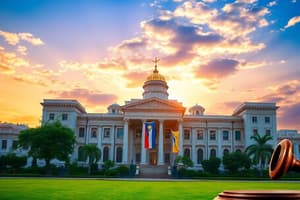Podcast
Questions and Answers
What is defined as a pronouncement or course of action that the government chooses to pursue or not to pursue?
What is defined as a pronouncement or course of action that the government chooses to pursue or not to pursue?
- Policy (correct)
- Statute
- Regulation
- Law
Which of the following indicates that the Philippines operates under both direct democracy and indirect democracy?
Which of the following indicates that the Philippines operates under both direct democracy and indirect democracy?
- It is governed solely by a monarch.
- It is a parliamentary system.
- It is a federal state.
- It is a democratic and republican state. (correct)
Which of the following concepts emphasizes that all acts of government must align with established laws?
Which of the following concepts emphasizes that all acts of government must align with established laws?
- Constitutional Supremacy
- Non-derogability of the Social Contract (correct)
- Social Contract Theory
- Principle of Legality
What term is used to describe the two chambers that make up Congress in the Philippines?
What term is used to describe the two chambers that make up Congress in the Philippines?
Which article in the Philippine Constitution highlights the oversight and scrutiny functions of Congress?
Which article in the Philippine Constitution highlights the oversight and scrutiny functions of Congress?
The redundancy of the terms democratic and republican within the Philippine Constitution serves to:
The redundancy of the terms democratic and republican within the Philippine Constitution serves to:
What is a significant characteristic of policy in relation to law?
What is a significant characteristic of policy in relation to law?
Which form of democracy is excluded from the definition of the Philippine government due to its structure?
Which form of democracy is excluded from the definition of the Philippine government due to its structure?
What does the case Desierto, 381 SCRA 48 pertain to?
What does the case Desierto, 381 SCRA 48 pertain to?
Which of the following is NOT a way to create a public office?
Which of the following is NOT a way to create a public office?
According to the discussions, what is true about the salary of a public officer?
According to the discussions, what is true about the salary of a public officer?
Who holds the title to the property according to Desierto, 381 SCRA 48?
Who holds the title to the property according to Desierto, 381 SCRA 48?
What is stated about public office when an incumbent dies or leaves office?
What is stated about public office when an incumbent dies or leaves office?
Which statement accurately describes public officers as per Sec. 2 (b), RA 3019?
Which statement accurately describes public officers as per Sec. 2 (b), RA 3019?
In the case Abeja vs. Tañada, what role does the wife have regarding the protest?
In the case Abeja vs. Tañada, what role does the wife have regarding the protest?
Which is considered a characteristic of public office in the context provided?
Which is considered a characteristic of public office in the context provided?
What does the doctrine of constitutional supremacy state about laws that violate constitutional norms?
What does the doctrine of constitutional supremacy state about laws that violate constitutional norms?
What does presidential immunity protect the President from?
What does presidential immunity protect the President from?
Which government entity is referred to as the GRP?
Which government entity is referred to as the GRP?
Which branch of government is primarily responsible for interpreting the law?
Which branch of government is primarily responsible for interpreting the law?
Which of the following does not represent a form of legislative oversight?
Which of the following does not represent a form of legislative oversight?
What is the effect of laws or contracts promulgated by the executive if they violate constitutional norms?
What is the effect of laws or contracts promulgated by the executive if they violate constitutional norms?
Which statement about the privilege of presidential immunity is true?
Which statement about the privilege of presidential immunity is true?
What is the primary purpose of the Office of the Solicitor General in the context of the Republic?
What is the primary purpose of the Office of the Solicitor General in the context of the Republic?
Who is eligible to be appointed to public office during their tenure as an elective official?
Who is eligible to be appointed to public office during their tenure as an elective official?
What is a necessary condition for civil service appointments in the Philippines?
What is a necessary condition for civil service appointments in the Philippines?
Which of the following is NOT a mode of acquiring title to office?
Which of the following is NOT a mode of acquiring title to office?
Which of the following powers are granted by law to public officers?
Which of the following powers are granted by law to public officers?
Who can serve as the Chair of the NEDA?
Who can serve as the Chair of the NEDA?
Which of the following is an implication of being an 'employee' of the government?
Which of the following is an implication of being an 'employee' of the government?
What type of powers are derived from expressed powers?
What type of powers are derived from expressed powers?
Which category includes government employees who have authority to act on behalf of the government?
Which category includes government employees who have authority to act on behalf of the government?
What does the right to self-organization entail for government employees?
What does the right to self-organization entail for government employees?
What was the ruling in the case of GSIS vs. Kapisanan regarding mass actions by government employees?
What was the ruling in the case of GSIS vs. Kapisanan regarding mass actions by government employees?
What does the Attrition Act allow regarding government employees who do not meet revenue targets?
What does the Attrition Act allow regarding government employees who do not meet revenue targets?
Under what conditions can the right to strike be regulated according to the content?
Under what conditions can the right to strike be regulated according to the content?
What does the ruling in Davao City Water District vs. Aranjuez indicate about workers expressing grievances?
What does the ruling in Davao City Water District vs. Aranjuez indicate about workers expressing grievances?
Which statement reflects the regulation of quota-dependent positions in revenue-earning agencies?
Which statement reflects the regulation of quota-dependent positions in revenue-earning agencies?
What is required of public officers upon assumption of office according to the information provided?
What is required of public officers upon assumption of office according to the information provided?
What fundamental rights are emphasized in the rulings regarding government employees?
What fundamental rights are emphasized in the rulings regarding government employees?
Study Notes
Preliminary Considerations
- Law is an act passed by Congress.
- Policy is a pronouncement or course of action the government chooses or doesn't choose to do
- Law is a policy but policy is not necessarily a law.
- Policy is broader than law, but its validity is measured by law.
- All acts of the government must be aligned with the law.
Constitutional Concepts and Principles
- The Constitution is the "Compact of the People" as described by the Social Contract Theory.
- The Constitution is not derogable.
- The doctrine of constitutional supremacy states that any law, contract, or act that violates the Constitution, regardless of who promulgated it, is null and void.
The Set-up of Government under the Constitution
- The Philippines is a democratic and republican state.
- The Constitution specifies both direct and indirect democracy.
- The Philippines is largely republican with the exception of initiative and referendum which are examples of direct democracy.
Branches of Government
- Legislative Branch: Composed of Senate (24 members) and House of Representatives (number of representatives varies).
- Legislative Branch's key functions:
- Oversight and scrutiny:
- Approving appropriations
- Confirming presidential appointments
- Holding question hour sessions (Executive Branch appears and answers inquiries)
- Congressional investigation
- Legislative supervision
- Oversight and scrutiny:
- Executive Branch: Headed by the President
- Judicial Branch: Composed of the Supreme Court (Chief Justice and 14 Associate Justices)
- All three branches of government are created by the Constitution.
- The Ombudsman is an independent body that investigates government officials.
Government of the Republic of the Philippines (GRP)
- GRP refers to the government entity through which the functions of government are exercised throughout the Philippines.
- This includes various government arms and levels of government.
Presidential Immunity
- Presidential immunity is not absolute.
- Presidential immunity protects from suit to allow the President to perform their functions free from hindrance.
- Immunity aims to protect the dignity of the office.
- The Office of the Solicitor General represents the Republic and acts as an agent for the people.
Creation of Public Office
- Public office can be created through three ways:
- By Constitution: Examples include the Offices of the House and Senate Presidents, the Supreme Court, the Ombudsman, and the National Economic and Development Authority (NEDA).
- By Law: Examples include the Bangko Sentral ng Pilipinas (BSP), Land Transportation Office (LTO), and Land Transportation Franchising and Regulatory Board (LTFRB).
- By Authority of Law: Offices created under authority granted by law are created through executive orders. Examples include the Department of Transportation and Communications (DOTR) regional offices.
Public Officer
- A public officer includes elective and appointive officials and employees.
- This applies to permanent or temporary employees, whether classified or unclassified service, regardless of whether they receive compensation.
- An officer exercises discretion or judgment on behalf of the office.
- An employee is one who serves the government and its instrumentalities.
Modes of Acquiring Title to Office
- Public office can be acquired through several modes:
- Appointment:
- All appointments in the civil service are based on merit and fitness.
- The merit and fitness of candidates is determined, as far as practical, by competitive examinations.
- This does not apply to policy-determining, primarily confidential, or highly technical positions.
- Election:
- Succession:
- Operation of Law:
- Appointment:
Powers, Rights, and Duties of Public Officers
- Powers:
- Expressed powers are those granted by law.
- Implied powers are derived from expressed powers.
Rights of Public Officers
- Public officers are guaranteed:
- Security of tenure
- Humane conditions of work
- Living wage
- Participation in policy and decision-making processes affecting their rights and benefits
- Right to self-organization:
- Government employees have the right to self-organize.
- This right applies to government-owned and controlled corporations (GOCCs) that have original charters.
- The right to strike may be regulated by law.
- Duties of Public Officers:
- Submitting a Statement of Assets, Liabilities, and Net Worth (SALN): Upon assuming office and thereafter as required by law.
Public Office is not a Personal Right
- Public office is personal to the incumbent.
- It is not inherited and cannot be passed on to heirs, unlike property.
- Public office is not a personal right.
- Public office is forfeited upon death.
Studying That Suits You
Use AI to generate personalized quizzes and flashcards to suit your learning preferences.
Related Documents
Description
This quiz explores the foundational concepts of the Philippine Constitution, including the principles of law and policy, constitutional supremacy, and the structure of government. Dive into the democratic framework and understand the balance between direct and indirect democracy in the Philippines.




